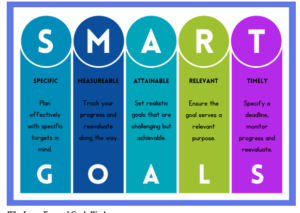By Dzigbordi KWAKU-DOSOO
In a world obsessed with grand visions and audacious targets, it’s easy to feel overwhelmed by the enormity of our ambitions. For business owners, managers, and high-performance professionals, the pressure to achieve can often feel insurmountable.
But what if the secret to achieving big wasn’t about taking giant leaps, but rather about mastering the art of small, laser-focused goals? Scientific evidence and real-world success demonstrate that incremental progress can dramatically transform goal achievement. By starting small and strategically building momentum, you can unlock substantial personal and professional breakthroughs.
The Science of Small Goals: Why They Work
Psychological research shows that breaking down big ambitions into small, actionable steps is not just practical—it’s essential for sustained success.
- The Progress Principle
According to The Progress Principle by Teresa Amabile and Steven Kramer, making consistent progress on meaningful tasks is the most significant driver of motivation and engagement. When we achieve even the smallest milestones, it creates a sense of accomplishment that fuels our momentum.
For instance, a business owner aiming to scale revenue by 20% might start by focusing on smaller, measurable steps like securing one new client per week. These incremental wins not only provide motivation but also build a clear path toward the larger goal.
- Dopamine: The Motivation Catalyst
Completing small tasks provides an immediate sense of achievement, thanks to dopamine, the brain’s “reward” neurotransmitter. This chemical release reinforces positive behavior, creating a cycle of motivation and progress. In the business world, this is crucial. For example, a manager tasked with reducing team turnover could focus on completing one employee feedback session each week. The sense of accomplishment from these incremental wins builds momentum and increases motivation to take on subsequent tasks.
By “hacking” your brain in this way, small wins transform daunting goals into actionable and rewarding steps, ensuring steady progress toward larger objectives. For high-performance individuals, this neurological boost can be a game-changer, keeping motivation high even in the face of complex challenges.
- The Compound Effect: Small Steps, Big Results
Darren Hardy’s The Compound Effect emphasizes the transformative power of small, consistent actions. Each small step compounds over time, leading to exponential growth—a concept highly applicable to business leaders. For instance, dedicating just 30 minutes each day to strategic planning might not feel impactful initially, but over months, this regular effort can result in better forecasting, improved processes, and significant growth.
For high performers, this principle underscores the importance of consistency. Whether it’s sending one follow-up email a day, improving customer response time by 1% weekly, or holding a brief daily alignment meeting with your team, these seemingly minor actions accumulate into substantial achievements.

Why Laser-Focused Goals Work
For business owners, managers, and high-performance professionals across Africa, the concept of laser-focused small goals offers a practical solution to common challenges in a rapidly changing and resource-constrained environment. Here’s why this approach is so effective:
- Reduced Overwhelm
African business environments often involve navigating multiple priorities—expanding markets, managing supply chain disruptions, or tackling infrastructure gaps. Big goals, like scaling operations to other countries in the region, can feel overwhelming. Breaking these ambitions into smaller, achievable tasks—such as securing a reliable logistics partner or identifying one viable market—makes them more manageable.
For example, a Ghanaian entrepreneur looking to expand their e-commerce platform might start with a specific goal: onboarding 10 new vendors in their first target region, such as the Ashanti Region. This focused action allows them to build a solid foundation in a key market before tackling the complexities of nationwide expansion. By concentrating on achievable, smaller steps, they can reduce the psychological burden of the larger goal while gaining valuable insights to refine their strategy.
- Improved Productivity
In Africa’s dynamic business environment, business leaders and high performers often face competing priorities, from addressing regulatory challenges to meeting growth targets. The ability to break down large objectives into smaller, focused tasks is critical to maintaining productivity. Research shows that smaller, prioritized actions help reduce decision fatigue and enable leaders to channel their energy into what matters most.
By focusing on high-impact, achievable tasks, professionals can make consistent progress while avoiding the paralysis that comes with trying to address too many issues at once. This approach not only boosts individual productivity but also aligns teams and organizations with clear, actionable priorities, ensuring that every effort contributes to long-term success.
- Enhanced Decision-Making
In fast-growing African economies, the Pareto Principle, also known as the 80/20 rule, highlights a universal truth: 20% of efforts often generate 80% of the results. This principle is particularly relevant for businesses operating in dynamic, resource-constrained environments where prioritizing the most impactful actions can make the difference between success and stagnation.
Focusing on small, high-impact goals allows leaders to allocate their time, energy, and resources efficiently. In practice, this means identifying the critical few tasks that deliver the most significant results and ensuring they are completed with excellence. For instance, rather than attempting to address a broad range of issues simultaneously—such as customer retention, operational efficiency, and market expansion—leaders who prioritize a singular focus achieve greater clarity, measurable outcomes, and faster progress.
This strategic focus aligns teams, reduces wasted effort, and fosters a culture of intentionality. The Pareto Principle reinforces the idea that not all actions are created equal; honing in on the most meaningful 20% ensures that energy is directed toward goals with the highest return on investment. This is particularly crucial in Africa, where resource optimization is often necessary to navigate economic fluctuations, regulatory challenges, and market-specific complexities.
- Adaptability in Dynamic Environments
Africa’s business landscape is constantly evolving, shaped by rapid urban growth, technological breakthroughs, and unpredictable economic policies. In such a dynamic setting, flexibility isn’t just an advantage—it’s a necessity. This is where laser-focused goals become invaluable. By breaking big plans into smaller, manageable steps, business leaders can stay nimble and adjust their strategies without losing sight of what truly matters.
When the unexpected happens—be it a sudden policy change or rising operational costs—having smaller, focused goals makes it easier to respond effectively. Instead of being paralyzed by the bigger challenge, leaders can tackle one issue at a time, steadily working toward solutions that keep their businesses moving forward. It’s a practical way to avoid getting overwhelmed and ensures that progress, even if incremental, is always being made.
This adaptability is critical in a continent where opportunities and challenges can shift overnight. With a focused, step-by-step approach, businesses can stay resilient, maintain momentum, and seize new opportunities as they arise.

How to Set Laser-Focused Goals
Achieving significant outcomes starts with the ability to break big ambitions into small, actionable, and meaningful steps. Setting laser-focused goals requires a structured approach that not only keeps you on track but also ensures your efforts yield measurable results. Here are 4 steps to do it effectively:
- Define Your Big Picture Objective
Start by identifying the overarching goal you want to achieve—whether it’s growing your business, enhancing team performance, or expanding into new markets. Clear objectives provide direction and purpose. Research by John Doerr in Measure What Matters highlights the importance of tying smaller tasks to these larger objectives to maintain alignment and focus.
Break this big goal into manageable parts, such as quarterly milestones or specific outcomes. For example, a goal like “increase revenue by 20%” can be divided into actionable sub-goals, such as acquiring a set number of new clients per quarter.
- Make Goals SMART
For each smaller goal, apply the SMART framework to ensure clarity and accountability:
- Specific: Clearly define what you aim to achieve.
- Measurable: Quantify progress to track results.
- Achievable: Ensure the goal is realistic given resources and constraints.
- Relevant: Align the goal with your larger business objectives.
- Time-bound: Set deadlines to maintain urgency.
Studies by Locke and Latham in Goal-Setting Theory show that SMART goals improve focus and increase the likelihood of success by eliminating ambiguity.
- Prioritize High-Impact Actions
Use the Pareto Principle (80/20 rule) to focus on the tasks that yield the highest returns. Instead of trying to address everything at once, identify the critical few actions that drive the most significant results. This approach is especially vital in resource-constrained environments, common in fast-growing economies.
For example, rather than diversifying marketing efforts across all channels, prioritize one high-impact strategy, such as improving customer retention or targeting a specific audience.
- Track, Adapt, and Celebrate Small Wins
Regularly monitor your progress to ensure you stay on track. Tools like OKRs (Objectives and Key Results) or project management software can help you evaluate performance and adjust goals as circumstances change. John Doerr’s OKR framework emphasizes the importance of flexibility and continuous assessment in maintaining relevance.
Equally important is celebrating small wins. Research shows that acknowledging incremental progress releases dopamine, boosting motivation and reinforcing positive behavior. Recognizing achievements—whether personal or team-based—sustains momentum toward larger goals.
For business leaders and high-performance professionals, success isn’t about doing everything at once—it’s about doing the right small things consistently. By breaking down your grand vision into laser-focused, actionable goals, you can reduce overwhelm, build momentum, and adapt to challenges with agility.
What’s one small goal you can set today to move closer to your larger ambitions? Maybe it’s sending that email, making that call, or taking 10 minutes to strategize your next steps. Start small, and watch the big results follow.
Even the tallest skyscrapers are built one brick at a time. Think small. Achieve big.
Are you ready for TRANSFORMATION?
Dzigbordi Kwaku-Dosoo is a Ghanaian multi-disciplinary Business Leader, Entrepreneur, Consultant, Certified High-Performance Coach (CHPC™) and global Speaker. She is the Founder and CEO of The DCG Consulting Group. She is the trusted coach to top executives, managers, teams, and entrepreneurs helping them reach their highest level of performance through the integration of technical skills with human (soft)skills for personal development and professional growth, a recipe for success she has perfected over the years. Her coaching, seminars and training has helped many organizations and individuals to transform their image and impact, elevate their engagement and establish networks leading to improved and inspired teams, growth and productivity.










